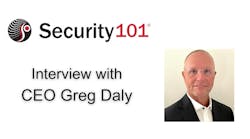The Great Conversation in Security featured a series of interviews with the Security Executive Council (SEC) and the attendees of their Next Generation Security Leader forum. One of the featured interviews was with Bob Hayes, the founder and managing director of the SEC. He has been a security operations manager and a CSO, so he knows what it takes to get there.
Hayes has led the SEC for well over a decade, identifying forward thinking security executives in private and public organizations, thought leaders in government and universities, and solution providers in technology and services.
The interview with Hayes, conducted by SIW Editorial Director Steve Lasky, brought out a number of key strategic pillars of the SEC that is helping to grow the professionalism of the industry:
- The SEC was formed because the security industry needed a disciplined research organization.
- The SEC’s 2020 Initiative was formed to provide leaders with the means to look forward and plan for the future.
- OPaL was launched to provide an assessment tool by which security leaders could gauge the organizational readiness, the program maturity and the leadership quotient of their organization.
- The Next Generation Security Leader forum and curriculum was launched to provide the lessons learned to the next generation of security leaders who will impact and drive the future of security
- The SEC is now working with universities to ensure that next generation business leaders have a true understanding of security’s value in the operation of the business.
One university that contributed heavily to the Next Generation Security Leader program was the University of South Carolina, which has one of the most prestigious business programs: The Darla Moore School of Business. It is consistently ranked as one of the top ten international business schools in the country.
One of the critical needs of the security industry, according to Hayes has been the lack of preparation of business leaders for dealing with risk and leveraging the role of the security professional. In the interview, Hayes says that they are influenced by what they learn on television. This drives ill-formed expectations and misunderstandings that impact their impressions of security professionals.
Security professionals also do not get leadership training. The training they do get is based on what Hayes calls the products of personal opinion; the books and articles published by self-described subject matter experts.
So the SEC basically has taken on the hard work over many years to build a collective knowledge database, leverages the database to create tools that current and future leaders can really use, packages it into compelling curriculum based training, and delivers it through targeted advisory through their faculty.
For example, according to Hayes, the NGSL provisions the three key pillars of an effective leader:
- Vision
- Strategy to get to the vision
- Communication platform for creating a common language with the organization’s leaders
The last one, communication, is critical. It is the basis for assembling the data that already exists, and sharing it in a way that is meaningful to their organization’s vision, goals and performance. Hayes quoted and paraphrased the Darla Moore Business School with a comment that drove home the significance of communication: There is no doubt in security’s value. The issue is how much management values security.
The SEC sees the NGSL program as pivotal to the next generation of leaders that can identify the key performance indicators of value inherent in their organization, and design a risk, resilience and solutions roadmap to support and defend that value over time.
The NGSL North American tour started in Seattle in March at The Great Conversation. It will arrive at the following cities and locations over the next 12 months:
- June 5, Los Angeles, Calif., Sony Pictures Entertainment
- Sept. 23, Chicago, Ill., The Union League Club of Chicago
- Oct. 28, Fairfax, Va., The Great Conversation in Security
- March 4, 2014, Seattle, Wash., The Great Conversation in Security
The proof points will follow. Many of these existing and emerging leaders will form a new perspective on value for their own operation, but also for their vendor relationships. This could impact buying decision behavior up and down the security value stream.
The SEC is also attempting to create accredited proof points for technology vendors that are willing to expose their clients and their work to the SEC to assess and qualify the results. If this can be proven, they become part of the Solution Innovation Program that provides another level of assurance and guidance to the SEC’s executive membership as well as to next generation leaders.
The SEC’s ability to stay current is anchored by effective research, compelling partnerships with other thought leaders and universities, seasoned advisors, and a growing alumni of next generation leaders.
The possibilities for the industry as a whole to become more valuable to its core stakeholders seems to have a formidable advocate and lever in the SEC’s strategic pillars. The industry eagerly anticipates the proof points that will be delivered over the next year as the SEC takes leadership, innovation and program measurement on the road.



